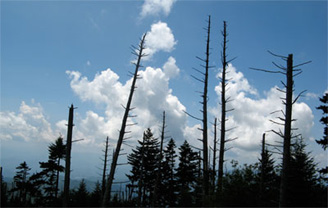Mountain pine beetles have devastated forests from Colorado to Canada over the past decade, but this year the trees aren't the only species at risk.
The pine beetle epidemic has killed or weakened millions of trees that might be toppled by high winds or storms, threatening roads, campsites, power lines, and people. Last month the U.S. Service outlined the dangers in a bulletin headlined "Watch Out! Beetle–Killed and Green Trees are Falling Across Roads and Trails." Recreation areas in the Northern Rockies with high concentrations of infested pines may be subject to campground and trail closures -- call the nearest Forest Service station before setting out.
Hot, dry weather in the Northern Rockies early in this decade reduced the pines' defenses against the beetles, which are a natural part of the ecosystem. Like wildfires, they carpet-bomb a forest, which then grows back better equipped to fight them off.
There's some consolation in knowing the mountain pine beetles are merely responding to changes in their environment. The far more insidious threat comes from imported pests like the famed gypsy moth and high-jumping Asian carp that has taken over the upper Mississippi River system. Killing them off is nearly impossible; often the best we can do is limit their spread.
One of the most basic ways campers and hikers can do that is to buy their firewood locally and burn it locally -- preferably at the same park -- and to leave any unburned firewood at their campsite. That way creatures like the Emerald Ash Borer, which threatens ash trees across the Midwest and Northeast, can't hitch a ride on a bundle of cut ash.
In Maine, where Trailspace is based, the state Legislature has banned the import of firewood into the state. "Many new infestations center around campgrounds, implicating camp firewood in this insect’s spread," the state department of forestry warns on its guide to invasive species.
The National Parks Service issued these tips for fighting the spread of invasive species:
-
Wash your vehicle to get plant materials out of your tires and undercarriage.
- Rinse gear, pressure-wash boats, skis, and other vehicles on site; organisms can get into any place water can get into. Use hot water if available.
- Clean your shoes or boots by knocking dirt and plant materials out of the treads. Carry a boot brush in your car or pack. Rinse soles.
- Wear short gaiters to keep sticky seeds out of your socks.
- Shake out your tent and other gear at the campsite to remove any plant or seed materials.
- Brush off or wash your pets if they have been out romping in the parks. Sticky seeds can hitchhike on their fur.
Need more facts on invasive species? Check out these links:
- I am a Hiker, Biker, Camper or Outdoor Enthusiast. Why should I care about invasive species? Great stuff from the University of Georgia Center for Invasive Species and Ecosystem Health.
- U.S. Forest Service's Bark Beetle page: Includes news bulletins, maps showing where the outbreaks are the worst, and links to state forestry sites. (See the Forest Service's regional offices page for contact info on local forests.)
- Front Range Mountain Pine Beetle Working Group. Wealth of data from agencies fighting the beetle on Colorado's Front Range of the Rockies.
- Emerald Ash Borer info: Shows how to identify this pest and provides tips on controlling it.
- Pathways: U.S. Fish & Wildlife Service page describing how invasive species travel.
- Forestry Images: Features pictures of invasive plants and animals.
Non-native pests do the most damage and are the most difficult to get rid of, so it's incumbent on all of us to practice deep-woods damage control.

 by Tom Mangan
by Tom Mangan












